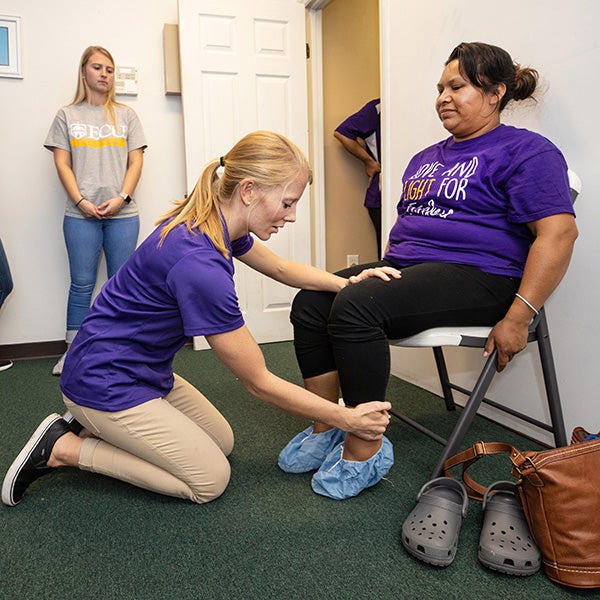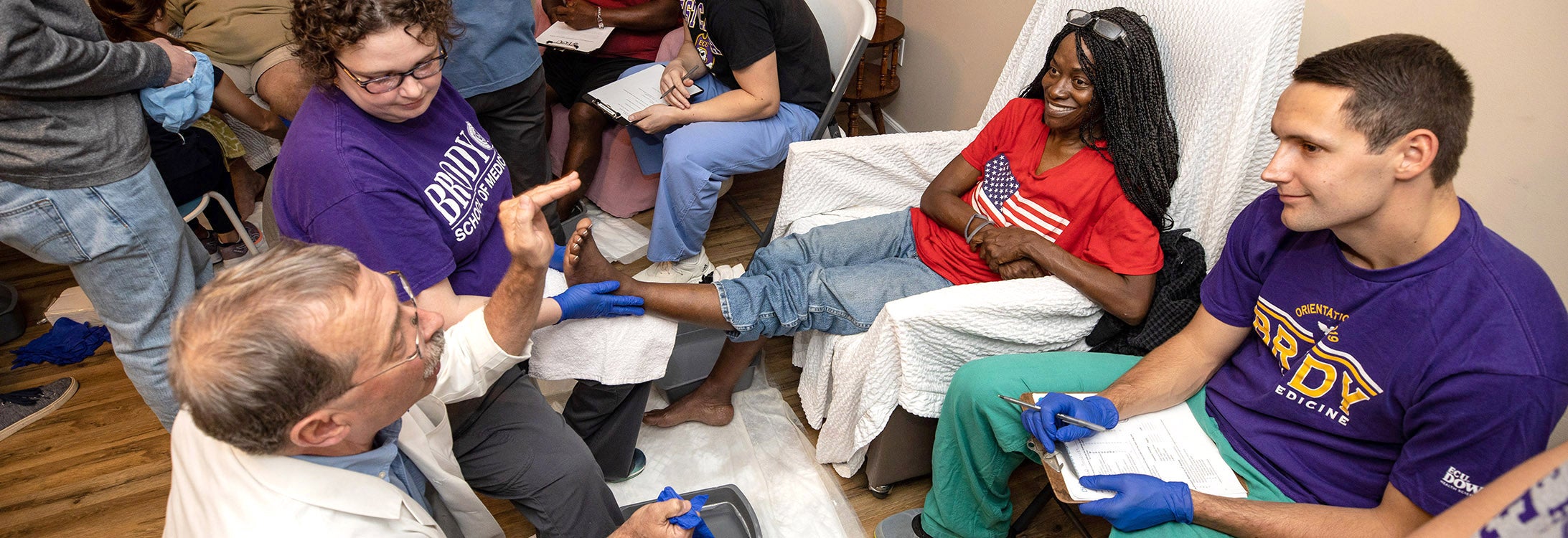IN YOUR SHOES
Medical, allied health students serve Greenville’s homeless population
A free foot clinic organized and staffed by ECU’s Brody School of Medicine students for Greenville’s homeless population has grown to provide additional services and better access to care for participants and more experience for students.
On Friday evening, 39 medical, physician assistant and physical therapy students along with a handful of pre-health undergraduates brought their skills to the Community Crossroads Center for the In Your Shoes foot clinic, washing shelter residents’ feet and providing free foot exams and treatment. They were joined by two podiatrists, four social workers and a family medicine physician.
Medical and physician assistant students and undergraduates were grouped together at seven foot-washing stations, where they checked shelter residents for calluses, ulcers and other pathologies that required treatment, and provided referrals to the podiatrists at the clinic, to area primary care physicians or to one of the area’s free clinics when necessary. Participants were then assessed by physical therapy students to address pain or balance issues and given gently-used shoes donated by Hope of Glory Ministries, as well as new socks.

Physical Therapy student Taylor McKeown works with a client during the In Your Shoes foot clinic at the Community Crossroads Center on Friday evening.
The clinic, the sixth of its kind, was originally created and staffed by Brody medical students and held at Vidant Medical Center. It has grown in the last two years to include physician assistant students and physical therapy students from ECU’s College of Allied Health Sciences. And now, the students have brought their services to the patients.
“The objective for us is to go to the population that we’re trying to serve because usually these individuals do not have a means of transportation,” said Dylan Flood, a third-year medical student who organized the event the last two years. Flood spearheaded the effort to include more health care disciplines in the clinic, and to incorporate additional training to the student participants beforehand.
“I was looking for a project that I could put time into that would be in service of the community,” Flood said. “I know that a lot of my classmates and a lot of the students I know in other professional schools felt the same way; they really wanted a chance to get out of the classroom and apply some of the things we were learning, and also help the community. I knew there were a lot of PA students and a lot of physical therapy students that were super enthusiastic about the exact same things. Bringing them in was just kind of a no-brainer because they wanted to be here.”
The students saw a total of 47 shelter residents during the clinic, with the majority receiving their first-ever foot exam. Nearly half of participants were uninsured, and 20 participants were referred to the podiatrist for additional care on the spot.
Regular foot assessments are especially important for those living with diabetes. If not treated properly, a cut on the bottom of the foot could lead to a difficult-to-treat infection or even amputation for someone with diabetes. According to an article published in The American Journal of Managed Care, 230 Americans with diabetes suffer an amputation each year. It is estimated that every 30 seconds a leg is amputated, and 85% of those amputations were the result of a diabetic foot ulcer.
On Friday, participant Hazel Bonaparte browsed the shoes following her physical therapy assessment, selecting a pair of sneakers and a pair of “church shoes.”
When asked what the most meaningful part of the clinic was, she responded: “The shoes, and speaking to the doctor. He was very knowledgeable in telling me how to get it together and what to do. He really educated me. I’m very glad for the clinic, and I’m glad they took the time to help us out.”
Third-year physical therapy student Bethany Hayes coordinated the physical therapy screenings. These screenings included assessing any pain and functional difficulties participants were experiencing and suggesting exercises and providing additional information about their pro-bono student-run physical therapy clinic for those who needed additional care.
“I just think it’s a good thing that we do for the community,” Hayes said. “I love the interprofessionalism of the different health care professions, and I love that we’re helping people who wouldn’t have this otherwise.”
